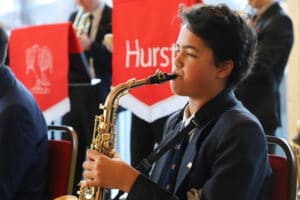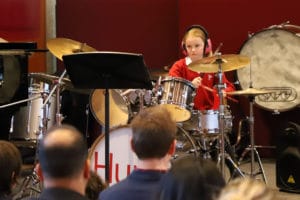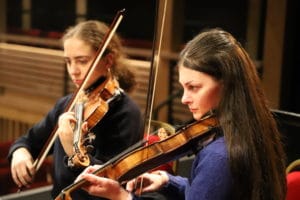Neil Matthews, Director of Music at Hurst College, explains why music-making should be inclusive, whilst also allowing the most able to fulfil their potential
“Music is my first love and it will be my last/Music of the future and music of the past/To live without my music would be impossible to do/So in this world of troubles my music pulls me through” John Miles Music 1976
 In this somewhat trite and ham-handed lyric, John Miles encapsulates what music means to virtually all of us on a purely human level. Music surrounds us in our daily lives whether we choose to listen or simply hear it as we go about our business. Music speaks to every one of us in some way or another and the process of creating it is something that everyone will experience at some point. From childhood nursery rhymes to the hymns and sporting anthems of adulthood, we will all engage in ensemble music-making. Music in any school is about creating as many opportunities for music-making in as many styles as possible. Those opportunities should be engaging, worthwhile and enjoyable whilst striving for the highest quality outcome possible.
In this somewhat trite and ham-handed lyric, John Miles encapsulates what music means to virtually all of us on a purely human level. Music surrounds us in our daily lives whether we choose to listen or simply hear it as we go about our business. Music speaks to every one of us in some way or another and the process of creating it is something that everyone will experience at some point. From childhood nursery rhymes to the hymns and sporting anthems of adulthood, we will all engage in ensemble music-making. Music in any school is about creating as many opportunities for music-making in as many styles as possible. Those opportunities should be engaging, worthwhile and enjoyable whilst striving for the highest quality outcome possible.
Correlation between music and academic achievement
Music plays a huge role in our children’s culture – it is everywhere – and fostering a genuine appreciation of all manner of styles and genres is key. Many studies have concluded that there is a correlation between learning music and academic achievement and this is easy to see. The single-minded determination required to succeed when playing an instrument is massive and the longitudinal approach towards any musical outcome helps to foster that way of working and thinking elsewhere. Music is both a solo and collaborative activity and, through honing their skills individually before making music with others, children develop socially and are encouraged to push themselves to achieve the best that they can. Ensemble music-making and sharing music collectively sparks intellectual thought and fosters the ability to listen, learn and lead. Both listening to and performing music can stimulate all manner of emotional responses from despair to sheer joy and, for many pupils, is an important outlet to express these emotions.
Participation regardless of experience and ability
 This is why it is so important that as much music-making as possible is available to all pupils. Nobody should ever be discouraged from taking part. We have all heard friends and colleagues declare that they can’t sing or play and all too often this is accompanied by a tale of a primary school teacher telling them that they couldn’t. Music (alongside all the other arts) is the adhesive which binds together our civilised society and, as music educators, we are at risk of closing the door on music completely for our pupils. It is important that we always remember there is something for everyone and no opportunity to perform or take part should ever be squandered. These musical opportunities do not need to centre around music created by traditional means either. With pupils having access to laptop and tablet devices, it is perfectly possible to create a unique and meaningful piece of music in a comparatively short time using readily available apps.
This is why it is so important that as much music-making as possible is available to all pupils. Nobody should ever be discouraged from taking part. We have all heard friends and colleagues declare that they can’t sing or play and all too often this is accompanied by a tale of a primary school teacher telling them that they couldn’t. Music (alongside all the other arts) is the adhesive which binds together our civilised society and, as music educators, we are at risk of closing the door on music completely for our pupils. It is important that we always remember there is something for everyone and no opportunity to perform or take part should ever be squandered. These musical opportunities do not need to centre around music created by traditional means either. With pupils having access to laptop and tablet devices, it is perfectly possible to create a unique and meaningful piece of music in a comparatively short time using readily available apps.
Music at Hurst has a key role as part of the weekly timetable – curricular and co-curricular. Protected time is set aside within the weekly timetable for instrumental ensemble music as well as choirs. It is an inclusive activity where all pupils are welcome to participate in all aspects of music regardless of experience and ability. The choir contains some 120 pupils and, for many of them, this will be their first experience of choral singing. It is most gratifying to discover that it is by no means their last either. To hear of former pupils who have left here to go on to join choral societies or other vocal groups at university or in the wider world means that we are getting something right. Similarly, all of our instrumental groups are open to all and this means that in many of our smaller ensembles, more experienced pupils can take the lead and play an important role in shaping the sound and direction of the group. All styles of music are accommodated, there are jazz, rock and classical concerts every term. We value the importance of live performance – barely a week goes by without a concert or recital of some sort.
Most able also thrive
 This inclusivity is all very well but how does this enable the most able to thrive too? In a school like Hurst, we are fortune to work with many exceptional musicians many of whom will go on to make performing music their profession. The Chamber Choir exists to nurture and train our best singers who will be applying for choral scholarships to top universities. Our vibrant team of visiting music staff will always be found in our suite of practice rooms coaching and guiding our most able. They also help them prepare for performances and competitions both in and out of school – alongside leading and playing in ensembles with our pupils. We have a large network of professional musicians who have connected with the department. They often give mock auditions and feedback to those pupils who are preparing to apply to conservatoires. Many of these musicians teach at the country’s top institutions so are well placed to give expert advice and insider’s insight.
This inclusivity is all very well but how does this enable the most able to thrive too? In a school like Hurst, we are fortune to work with many exceptional musicians many of whom will go on to make performing music their profession. The Chamber Choir exists to nurture and train our best singers who will be applying for choral scholarships to top universities. Our vibrant team of visiting music staff will always be found in our suite of practice rooms coaching and guiding our most able. They also help them prepare for performances and competitions both in and out of school – alongside leading and playing in ensembles with our pupils. We have a large network of professional musicians who have connected with the department. They often give mock auditions and feedback to those pupils who are preparing to apply to conservatoires. Many of these musicians teach at the country’s top institutions so are well placed to give expert advice and insider’s insight.
Whilst music at Hurst is about inclusivity alongside quality, it is also about allowing the most able to fulfil their potential and achieve the best that they can. It is about all of us, pupils and staff, working together as equals to make the best music possible.
Please follow the links below for further information about Hurst College, an independent, co-educational, day and flexi/weekly boarding school for pupils aged 4–18, located just to the north of the village of Hurstpierpoint, West Sussex.
Prep & Pre-Prep
Senior School
Sixth Form
Admissions
College Campus
Facilities
Hurst College’s inspection reports and reviews:
ISC Inspection reports
Good Schools Guide
Muddystilettos.co.uk
